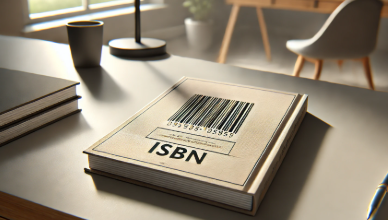Let’s be real—book titles are a big deal. They’re not just labels slapped on a cover; they’re your book’s first handshake, elevator pitch, and dating profile all rolled into one. A strong title can spark curiosity, convey emotion, and turn casual browsers into eager readers. A weak one? Well, let’s just say it might end up collecting digital dust.
In today’s overcrowded book market—where thousands of titles launch every day—your book title isn’t just a creative decision; it’s a strategic one. In fact, a study published in ScienceDirect found that emotionally charged titles, especially when paired with a compelling cover, significantly boost consumer interest. The psychology behind book titles shows that we’re wired to respond to emotional cues, and a well-worded title can instantly connect with a reader’s curiosity, values, or sense of wonder.
In this guide, we’ll help you navigate the world of book title ideas—how to format them, how they’re written, and how to craft one that grabs attention and doesn’t let go. Whether you’re writing literary fiction, self-help, or your first cozy mystery, you’ll walk away with practical tips, creative prompts, and the confidence to name your book like a pro.
Why Book Titles Matter (Way More Than You Think)
A great book title does more than decorate a book cover—it invites, intrigues, and influences. It’s the gateway to your book’s world, often serving as the first interaction a potential reader has with your work. Whether someone is browsing a cozy bookshop or scrolling through Amazon at midnight, your title has mere seconds to grab their attention and spark curiosity.
But a title isn’t just about that initial click or shelf grab. It’s also a powerful book marketing tool that encapsulates your book’s tone, genre, and emotional promise—all in just a few words. A well-crafted title sets the tone, hints at the narrative, and gives readers a taste of what’s inside. For instance, a title like The Whispering Shadows instantly suggests mystery and mood.
The best book titles are memorable and easy to recall, which helps readers recommend them to others—fueling the kind of organic buzz every author dreams about. And in the digital age, titles do double duty: they need to appeal to humans and algorithms. Including relevant keywords in your title (or subtitle) can enhance searchability on platforms like Amazon and Google, giving your book a vital edge in a crowded market.
In short, your book title isn’t just a creative decision—it’s one of the most strategic moves you’ll make as an author.
The Power of a Perfect Title: How It Impacts Book Success
A well-chosen book title profoundly influences a book’s success, serving as a critical touchpoint between the work and its potential readers. An effective title not only captures attention but also resonates with the target audience, setting expectations and enticing readers to explore further.
The title’s alignment with the book’s content is paramount. When a title accurately reflects the narrative and tone, it establishes a promise that the content fulfills, leading to satisfied readers who are more likely to leave positive reviews and recommend the book to others. This congruence between title and content fosters trust and enhances the reader’s overall experience.
In a saturated literary market, a unique and compelling title serves as a differentiator, making a book stand out among countless others. This distinctiveness not only draws initial attention but also aids in memory retention, increasing the likelihood of word-of-mouth promotion—a powerful driver of book sales.
Moreover, the cultural impact of a thoughtfully crafted title cannot be understated. Iconic titles often transcend the books themselves, embedding into popular culture and language. For instance, titles like “1984” or “Catch-22” have become synonymous with the themes they explore, illustrating the enduring influence a well-chosen title can have beyond the literary world.
In essence, the title of a book is not merely a label but a strategic tool that encapsulates the essence of the work, appeals to the intended audience, and significantly contributes to the book’s commercial and cultural success.
How to Choose the Perfect Book Title (Without Losing Your Mind)
Picking the right book title isn’t just a creative challenge—it’s a strategic decision that can make or break your book’s first impression. Your title is the hook, the handshake, and often the only thing standing between your manuscript and a reader’s curiosity. It needs to strike the perfect balance between clarity and intrigue, all while staying true to your story’s core. Sounds like a tall order? It is—but it’s doable, especially with the right approach.
Here’s how to choose a title that connects with your audience and stands out in a crowded marketplace:
Step 1: Capture the Essence of Your Book
Your title should reflect the heart of your story or message. Ask yourself: What’s the central theme or transformation? What feeling or image should readers associate with your book? A great title offers a sneak peek at what’s inside—without giving everything away.
Step 2: Speak Your Audience’s Language
Think about who you’re writing for. A romance reader expects a very different vibe than someone picking up a productivity book. Use tone, keywords, and genre cues that feel familiar and appealing to your ideal reader. This not only increases connection—it boosts your book’s discoverability too.
Step 3: Keep It Short, Sharp, and Memorable
The best titles are often just a few words long. Why? Because short titles are easy to remember, easy to say out loud, and easy to search. One-word titles (Dune, Educated, Blink) can be powerful if they pack the right punch, while slightly longer titles (The Subtle Art of Not Giving a Fck*) thrive when they’re bold and clear.
Step 4: Make It Original—but Not Confusing
Originality helps you stand out, but clarity keeps you relevant. Your title should be distinctive enough to rise above the noise, but not so obscure that it leaves readers guessing. Use metaphors, juxtaposition, or wordplay with purpose—and avoid clichés unless you’re flipping them in a clever way.
Step 5: Think Like a Marketer
Your title will live on covers, ads, emails, online listings, and search engines. Consider how it will look on a thumbnail, how it sounds when spoken aloud, and whether it includes any keywords that can help with SEO. It should catch the eye, spark interest, and be easy to recall later—especially when a reader is telling a friend.
Quick Title Checklist:
- Does it reflect the book’s theme or tone?
- Will it resonate with my target audience?
- Is it clear, memorable, and easy to spell?
- Does it fit the genre (or cleverly subvert it)?
- Would I click on it if I saw it online?
In short, crafting the perfect book title is part creativity, part strategy, and part knowing your audience inside and out. When done right, it becomes more than a label—it becomes a powerful tool that elevates your work and sets the tone for everything that follows.
Book Title Ideas (And How to Come Up With Your Own)
Staring at a blank screen, waiting for the perfect title to appear? You’re not alone. Crafting a great book title can feel like trying to name a child—you want something that’s meaningful, memorable, and stands out at the playground (or bookstore). The good news? There’s a method to the madness.
Categories of Effective Book Titles
Most successful book titles fall into a few tried-and-true categories:
- Theme-Based Titles: These highlight the core idea or message of your book. Atomic Habits or Start With Why are great examples in nonfiction.
- Character-Driven Titles: Perfect for fiction, these feature your protagonist or an iconic figure, like Eleanor Oliphant Is Completely Fine.
- Evocative Phrases: These stir emotion, spark curiosity, or paint a picture—think The Silent Patient or The Midnight Library.
- One-Word Powerhouses: Titles like Dune, Room, or Beloved prove that less can absolutely be more.
- Question Titles: Intriguing and direct, these spark curiosity (e.g. Are You There God? It’s Me, Margaret).
Brainstorming Techniques That Actually Work
If your working title feels… well, not working, here are a few ways to generate fresh ideas:
- Mind Mapping: Start with your book’s theme or message in the center of a page and branch out with connected words, moods, or imagery.
- Metaphor Mining: Look for metaphors in your writing. A powerful image or symbolic phrase might be hiding in plain sight.
- Line-Pulling: Comb through your manuscript for compelling lines of dialogue or narration. Sometimes your title is already written—it just needs to be noticed.
Try a Book Title Generator (Yes, Really)
Online tools like Reedsy’s Book Title Generator or StoryToolz can kickstart your creativity. While they’re unlikely to hand you your final title on a silver platter, they can offer prompts and combinations that help unlock fresh ideas. Think of them as brainstorming buddies, not magic solutions.
When You’re Feeling Stuck
If you’re spinning your wheels, try these:
- Make a list of 20+ title options—seriously. Don’t worry if they’re bad.
- Step away. Let your brain breathe. Inspiration often hits when you’re doing something unrelated.
- Say titles out loud—some sound better spoken than read.
- Get feedback from beta readers or writer friends. What grabs them?
- Revisit your favorite books. What made those titles memorable?
Remember: the perfect title might not arrive in a flash of brilliance. It often shows up after you’ve made space for it.
Fiction vs. Non-Fiction: Tailoring Your Title
Choosing a book title isn’t one-size-fits-all—and it definitely isn’t genre-agnostic. The way you title a cozy mystery is worlds apart from how you’d title a productivity guide. Understanding the key differences between fiction and non-fiction titles will help you craft something that connects with your target audience from the very first glance.
Tone, Approach, and Reader Expectations
Fiction titles often aim to spark curiosity, emotion, or imagination. They tend to be evocative, poetic, or mysterious—designed to lure readers into a story world. Think Where the Crawdads Sing or The Night Circus.
Non-fiction titles, on the other hand, prioritize clarity and directness. Readers want to know what they’re getting. Titles like Can’t Hurt Me or The Life-Changing Magic of Tidying Up promise specific outcomes, lessons, or transformations.
Emotional vs. Informational
Fiction leans into emotion and atmosphere. Your goal is to tease a mood, a character, or a hint of mystery without giving too much away. Titles should resonate emotionally and leave readers wanting more.
Non-fiction focuses on delivering a clear benefit or insight. It’s all about what the reader will gain—whether that’s better habits, historical knowledge, or business skills. Think in terms of promise and payoff.
Subtitles: The Non-Fiction Superpower
In non-fiction, subtitles are your best friend. They allow you to get creative with your main title while using the subtitle to explain the book’s content and value.
Example:
Main Title: Quiet
Subtitle: The Power of Introverts in a World That Can’t Stop Talking
A subtitle boosts SEO, clarifies the topic, and adds credibility. It also helps target the right readers in crowded categories like self-help, health, or business.
Genre-Specific Conventions
Each genre has its own title “vibe”—and savvy readers know how to spot them.
- Romance: Often emotional, poetic, or character-based (It Ends With Us, Beach Read)
- Thrillers/Mystery: Sharp, urgent, and suspenseful (Gone Girl, The Silent Patient)
- Fantasy/Sci-Fi: World-building terms or strong imagery (Mistborn, Neuromancer)
- Memoirs: Personal, emotional, often a twist on a familiar phrase (Educated, Becoming)
Matching your title to genre conventions isn’t about being formulaic—it’s about meeting reader expectations while still standing out.
The Power of One-Word Book Titles
Sometimes, less really is more—especially when it comes to book titles. A single, well-chosen word can pack a surprising punch, capturing the mood, theme, or essence of your book in a bold, memorable way. One-word titles are clean, eye-catching, and often easier to remember, making them a strategic favorite for both indie and traditionally published authors.
Why Simplicity Works
One-word titles grab attention because they cut through the noise. In a sea of long, descriptive titles, a bold single word stands out—mysterious, intriguing, and often powerful in its ambiguity. Think Divergent, Beloved, Outliers, or Room. These titles spark curiosity and invite the reader to dig deeper. They also tend to look strong on covers and work well in digital thumbnails.
One-word titles work across fiction and non-fiction, as long as they’re thoughtfully chosen:
- Thriller/Mystery: Gone, Hostage, Shatter
- Fantasy/Sci-Fi: Mistborn, Dune, Leviathan
- Romance: Archer, November, Reminders
- Memoir/Non-Fiction: Educated, Quiet, Blink
Each of these titles is distinctive, genre-appropriate, and emotionally resonant.
Pros and Cons of One-Word Titles
Pros:
- Instantly memorable and easy to recall
- Visually strong and clean on book covers
- Work well for branding in a series (e.g. Divergent, Insurgent, Allegiant)
- Ideal for word-of-mouth marketing
Cons:
- Can be vague if not anchored by strong branding or cover design
- May require a subtitle (especially for non-fiction) to provide context
- Harder to rank for in search engines if the word is generic (Hope, Love, Lost)
How to Make a One-Word Title Meaningful
To give your one-word title depth:
- Choose a word with emotional or symbolic weight — something that carries layers of meaning.
- Tie it directly to your book’s theme or conflict so that once the reader finishes the book, the title takes on even more significance.
- Use strong design to support and elevate the title—typography, color, and imagery all play a role in making it land.
- Pair it with a subtitle (if nonfiction) to clarify your promise and improve SEO.
Done right, a one-word title can become iconic—something readers remember, talk about, and instantly associate with your message or story.
How to Format Book Titles Properly
Once you’ve come up with the perfect book title, the next step is to present it professionally—whether you’re publishing traditionally, self-publishing, or pitching your manuscript. How you format your book title can impact how it’s perceived, both in your manuscript and across promotional materials.
General Formatting Rules
When referencing your own or other books in writing, always:
- Capitalize the main words (title case), including nouns, verbs, adjectives, adverbs, and pronouns.
- Do not capitalize minor words unless they’re the first or last word (e.g., “of,” “and,” “in,” “the”).
- Example: The House in the Cerulean Sea, A Court of Thorns and Roses.
Formatting in Manuscripts
In query letters, synopses, or emails:
- Italicize your book title: The Midnight Library
- In handwritten notes or when italics aren’t possible (like SMS or plain text): use quotes — “The Midnight Library”
When to Use Subtitles
If your book needs added clarity or keyword reinforcement (especially in nonfiction), a subtitle is your best friend. A subtitle:
- Helps clarify the content and promise of the book
- Enhances searchability with SEO-relevant terms
- Example: Essentialism: The Disciplined Pursuit of Less
Pro Tip: Use colons or em dashes to separate title and subtitle — whichever suits the tone best.
Formatting for Covers and Listings
Your title should be:
- Readable at a glance—especially in thumbnail images
- Clean and well-spaced
- Not overwhelmed by decorative fonts or distracting design
Remember: the right title is only half the battle—formatting it clearly and professionally helps it land with maximum impact.
Common Mistakes to Avoid in Title Selection
Even the most beautifully written book can suffer from a title that just doesn’t land. Whether it’s confusing, overused, or just plain boring, a weak title can sink your book before a reader even flips to page one. Here’s how to steer clear of the most common pitfalls when naming your book.
Being Too Vague or Abstract
Titles that are overly poetic or mysterious might sound elegant to you, but if they leave readers scratching their heads, they won’t do your book any favors. Aim for intrigue, not obscurity. A little mystery is good—total confusion is not.
Instead of: Whispers Beyond the Light
Try: The Ghost in Room 9
Overloading the Title with Keywords
Yes, SEO matters. But stuffing your title with buzzwords or generic terms can make it feel lifeless and algorithm-built. The best titles balance marketability with creativity.
Instead of: Productivity Hacks for Entrepreneurs, CEOs, and Remote Workers
Try: Time Boss: How Smart People Get More Done
Misleading Your Reader
Your title should reflect the true tone and content of your book. If you promise a steamy romance and deliver literary fiction about grief, readers will be confused—and possibly annoyed.
Quick Test: Imagine someone choosing your book based only on the title. Would they be surprised (in a bad way) once they start reading?
Sounding Like Everything Else
It’s tempting to mimic trends, especially if you’re in a crowded genre. But titles that blend into the background don’t get remembered. Instead of following the crowd, look for ways to twist conventions.
Too Generic: The Girl in the Fog
More Distinctive: She Vanished at Dusk
Forgetting to Research Existing Titles
Before you fall in love with your title, search it on Amazon, Goodreads, and Google. If ten books already exist with the same name, consider tweaking it. You want your title to be searchable—and uniquely yours.
Finalizing Your Book’s Title
You’ve brainstormed, outlined, and shortlisted. Now comes the moment of truth: choosing the title. Finalizing your book title isn’t just about picking the one that “sounds nicest”—it’s about aligning creativity with strategy, clarity with emotion, and instinct with feedback.
Revisit Your Core Message
Step back and ask: Does this title reflect the heart of my book? Whether it’s a sweeping fantasy or a practical guide, your title should hint at the experience readers are about to enter. It doesn’t have to explain everything—just enough to intrigue.
Say It Out Loud (Then Google It)
Your title should roll off the tongue and look great on a cover. Try saying it in a sentence (“Have you read [Your Title]?”). Then do your homework—check if other books already use the same or similar phrasing. If it’s taken, especially in your genre, tweak it.
Test It with Real People
Gather feedback from your writer’s group, editor, beta readers, or trusted friends. You don’t need a focus group, just honest opinions. Ask:
- What do you expect this book to be about based on the title?
- Would you be curious enough to click on it or pick it up?
Trust Your Gut (But Check the Strategy)
At some point, it comes down to instinct. The right title should feel exciting, true to your work, and something you’d be proud to share. That said—don’t ignore the practical stuff: clarity, memorability, SEO value, and genre alignment.
Commit with Confidence
Once you’ve picked the final title, embrace it. From your book cover design to your marketing strategy, everything will build around this name. Make sure it’s one you love—and one readers will remember.
Naming Your Book with Purpose and Power
Choosing a book title isn’t just another item to tick off your publishing checklist—it’s your book’s first impression, your best marketing hook, and your most quoted line. Whether you’re drawn to poetic phrasing, clever wordplay, or bold simplicity, the right title does more than summarize—it sells, intrigues, and sticks.
From understanding your audience to reflecting your genre and tapping into SEO potential, every decision you make around your title plays a role in how your book will be discovered and remembered. Don’t rush it. Brainstorm widely, test often, and trust your instincts.
At the end of the day, your book title should feel like a promise to your reader—and one you’re proud to keep.
Your Publishing Journey Awaits – Start NowFAQs – Creating Book Titles
Q1: How to format book title?
Book titles should be italicized when typed (e.g., The Great Gatsby) and underlined when handwritten. In most style guides like APA, MLA, and Chicago, the title is capitalized in title case, meaning major words are capitalized while short articles and prepositions are not (e.g., To Kill a Mockingbird). Make sure the title stands out visually from surrounding text, especially in essays or publications.
Q2: How are book titles written?
Book titles are typically written in title case—capitalizing the first and last words, as well as all major words in between. They are also often italicized to distinguish them from other text. In publishing and marketing, clarity, originality, and tone are essential when crafting the title itself. It should reflect the content and appeal to the intended audience.
Q3: What is a catchy title for a book?
A catchy book title grabs attention quickly, often by sparking curiosity or evoking emotion. It may use alliteration, contrast, or metaphor to be memorable and impactful. Examples include Gone Girl, Big Magic, or The Silent Patient. A good rule of thumb is: if you’d be intrigued by it on a shelf, others probably will be too.
Q4: How do I start off a book?
Starting a book often begins with a compelling hook—a question, image, or moment that draws the reader in. From there, it helps to establish your voice, introduce a key character or conflict, and give the reader a reason to turn the page. Many authors also draft a working title early in the process to keep their vision focused as they write.
Q5: What is a good name for a mystery story?
A good mystery title usually hints at the suspense, danger, or intrigue within. Titles like The Girl with the Dragon Tattoo or In the Woods create atmosphere while raising questions the reader wants answered. Think about your book’s central theme, the stakes, or a key clue that could be woven into the name.
Q6: What should my book name be?Your book’s name should reflect its tone, genre, and core message. Ask yourself what emotion or idea you want readers to associate with your story. Consider brainstorming categories (theme-based, character-focused, metaphorical) and test them on friends or readers for feedback. A great title connects the dots between your content and your audience’s curiosity.








